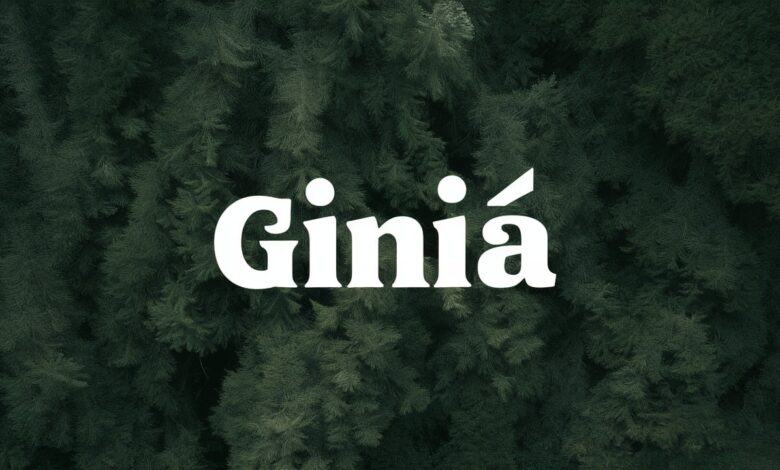Giniä: Unveiling the Origins, Meaning, and Rising Significance of a Mysterious Name

In a digital world overflowing with new names, neologisms, and brand identities, the emergence of unique words often signals more than just creative whim—they represent a shift in culture, identity, and collective imagination. Among such words gaining attention in recent times is “Giniä”. With its melodic rhythm, mysterious accent, and visual elegance, “Giniä” is more than just a name—it is a linguistic and symbolic phenomenon that is starting to spark curiosity across various domains.
From forums discussing rare names to branding agencies looking for distinctive identities, Giniä is slowly but surely marking its presence in modern culture. But what exactly is Giniä? Where does it come from? And why is it becoming relevant now? This article dives deep into the world of Giniä—exploring its possible meanings, etymology, cultural context, and growing usage as a symbol of uniqueness, elegance, and transformation in the 21st century.
The Etymology and Possible Origins of Giniä
Though not a widely recorded word in mainstream dictionaries, “Giniä” carries a structure that evokes linguistic influences from Nordic, Germanic, or constructed languages (like Esperanto or fictional dialects). The use of the diaeresis (ä) is common in Scandinavian and certain fantasy or poetic constructs, which gives the name an otherworldly, graceful tone.
In speculative terms, “Giniä” may have evolved from or be inspired by similar-sounding names or concepts:
-
Gina or Ginia – shortened versions of Regina (meaning “queen” in Latin).
-
Gini (as in Gini coefficient) – an economic term referring to inequality, though in this context, it’s likely unrelated.
-
Ä – often added to create a sense of softness, femininity, or elegance.
This blend of linguistic ambiguity and aesthetic appeal is one reason why “Giniä” is becoming an attractive choice for baby names, character names in literature or gaming, branding for niche businesses, or simply as a pseudonym in digital communities.
Giniä as a Name: Elegance, Empowerment, and Identity
In an era where names are chosen not just for heritage but for symbolism and style, Giniä embodies qualities that many parents, writers, and creators are seeking. It sounds soft but confident, simple but memorable. The name rolls off the tongue, while the accented “ä” provides a visual and phonetic distinction that sets it apart from more common alternatives.
As a name, Giniä may be interpreted to symbolize:
-
Grace and poise – from its flowing phonetic pattern.
-
Individuality – due to its rarity and creative spelling.
-
Modern femininity – especially appealing in artistic or intellectual circles.
-
Mystique and elegance – enhanced by the diaeresis, which invites curiosity.
Already, Giniä is appearing in baby name lists, character databases, and username selections across platforms like Instagram, TikTok, and Wattpad—places where personal branding is key. It captures the modern desire to be unique without being obscure, culturally open without being overdefined.
The Cultural Usage of Giniä: From Language to Lifestyle
Beyond being a name, Giniä is being explored as a brand identity, concept term, or even fictional universe keyword. Designers, writers, and marketers understand that creating something new and resonant often begins with a strong word. Giniä fits the profile of a name that can become:
-
A fashion or beauty brand focused on elegance and sustainability.
-
A music artist or influencer handle, reflecting individuality.
-
A lifestyle label, especially one centered on mindfulness, wellness, or modern aesthetics.
-
A fictional language or character in a fantasy or sci-fi universe.
Its neutrality and versatility allow it to transcend cultural borders, making it appealing for international use while maintaining a boutique, artisanal feel. This is especially important in branding, where global audiences value inclusivity but also crave differentiation.
Why Giniä Is Relevant in 2025 and Beyond
In the post-digital era, where we are redefining identity in both the physical and virtual realms, names like Giniä are more than placeholders—they are statements of intention. People want to be remembered, and the names they choose—whether for their children, products, businesses, or digital avatars—are a part of that memory.
Giniä aligns perfectly with trends we’re seeing in 2025:
-
Minimalism with character – a single name that says much without being cluttered.
-
Global-nonbinary aesthetics – names that feel gender-fluid, soft, and smart.
-
SEO and digital presence – unique enough to rank, search, and claim across platforms.
In short, Giniä is rising because it’s timely and timeless, simple yet profound. It fits our need for creative self-expression, unique digital identity, and emotionally resonant naming.
Conclusion: Giniä as a Word, A Name, and a Modern Identity Symbol
Whether viewed as a word, a name, or a cultural symbol, Giniä represents far more than its five letters. It is a linguistic creation that bridges beauty and curiosity, tradition and modernity. From personal names and brand identities to online handles and creative expressions, Giniä has the rare power to feel both familiar and new—a perfect harmony for an age that values authenticity above all.
In a noisy world of repetitive terms and common identifiers, Giniä stands out like a star in a clouded sky—quiet, bright, and unforgettable. As we move forward into an era where naming becomes an art of personal storytelling, Giniä is poised to become a new classic in the making.
❓ FAQ About Giniä
1. What does the name “Giniä” mean?
Giniä doesn’t have a fixed meaning in formal dictionaries but is often interpreted as a name symbolizing grace, uniqueness, and poetic elegance. Its roots are speculative, making it ideal for modern, personalized use.
2. Is Giniä a real word or name?
Yes, Giniä is being used as a personal name, brand name, or username across platforms. While it may not yet be traditional, its growing digital and cultural usage makes it “real” in contemporary language.
3. How is “Giniä” pronounced?
It’s typically pronounced “JIN-ee-uh” or “GEE-nee-uh,” depending on regional accent or user preference. The diaeresis (ä) suggests a slight pause or softer vowel emphasis.
4. Is Giniä a popular baby name?
Giniä is currently considered a rare or emerging baby name. It is gaining traction among parents looking for distinctive and meaningful names in 2025.
5. Can Giniä be used for branding?
Absolutely. Giniä’s uniqueness and elegance make it ideal for boutique brands, digital startups, personal blogs, beauty lines, and more.



